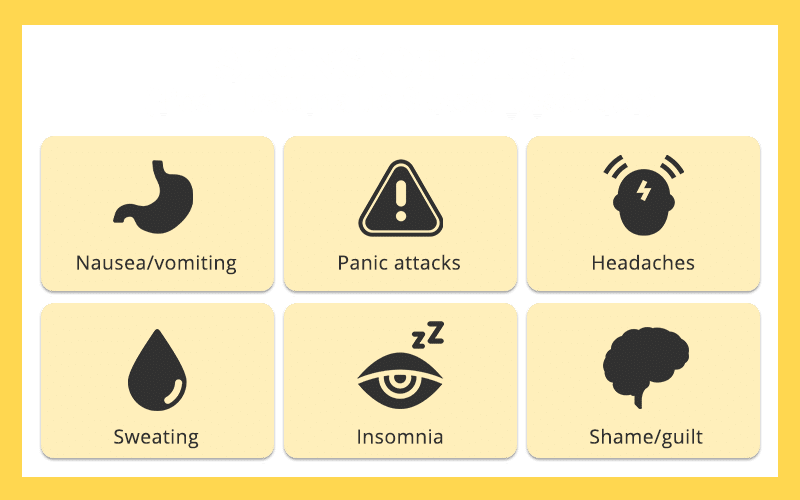Did you know that trauma and addiction often go hand and hand? Although we have well-developed protocols for addiction treatment, the underlying trauma doesn’t always get the attention it deserves.
Research suggests that one out of 10 people have a substance abuse disorder, and seven out of ten people have experienced at least one traumatic event. Twenty percent of traumatized people develop post-traumatic stress disorder (PTSD).

Table of Contents
What is Trauma?
According to the Substance Abuse and Mental Health Services Administration (SAMHSA), trauma is an event or circumstance that causes harm to an individual and has a profound impact on their mental, physical, social, or emotional health. Trauma can involve exceptional and sustained stress, abuse of all kinds, threats, injuries, and shock.
Trauma is a personal and singular experience. Everyone responds differently. No one else can fully appreciate how trauma affected you. Trauma is defined as a response to an event that you experience as being harmful to your health and well-being.
Several addiction professionals believe there is a strong connection between trauma and addiction. Some even go so far as to say that addiction is a symptom of underlying trauma.
Traumatized people don’t always know they’ve been traumatized. The trauma may be deeply buried. Someone who has been injured by a trauma that remains unresolved may seek comfort from alcohol, drugs, food, sex, and other activities that temporarily ease the pain caused by the trauma. Addiction becomes a treatment for unresolved traumatic pain.
Not all people develop trauma following a stressful event, and there are different types of trauma. Some people get symptoms of trauma after a stressful event, but the symptoms resolve within a few weeks. Others can experience symptoms of trauma for the rest of their lives.
Trauma can include devastating or horrific experiences such as being in a war zone, seeing a terrorist attack, or witnessing the death of a loved one.
It can be triggered by less intense events, too. Divorce, the death of a parent, retirement, or an empty nest can all be traumatizing.
Examples Of Trauma
Some researchers believe that the incidence of trauma in the U.S. is as high as 75 percent. Trauma can happen once or multiple times. Here are some experiences that most of us would find traumatic:
- Sexual, physical, and emotional abuse or assault
- Childbirth
- Traffic accidents
- Bullying and harassment
- Terminal illness
- Being kidnapped
- Natural disasters
- War
What Is PTSD?
When symptoms don’t clear up within a few weeks, the trauma may develop into post-traumatic stress disorder (PTSD). If you experience trauma, and your symptoms continue or get worse, you may have PTSD.
This disorder can cause intense panic and anxiety fueled by intrusive memories and flashbacks related to the traumatic event. Avoidance behaviors can occur. The person tries to block out the trauma by avoiding the place where it happened. Symptoms can last for months or even years.
You are at risk for PTSD if any of the following are true for you:
- History of trauma
- Lack of support after a traumatic experience
- Being in an already stressful situation when the trauma occurs
- History of anxiety or depression
- Physical injury or being in pain

What Are the Symptoms Of PTSD?
Trauma can generate a wide range of symptomatic responses that can indicate the presence of PTSD.
Physical Symptoms
The emotional responses generated by the trauma can affect the body and cause physical symptoms such as these:
- Nausea
- Vomiting
- Panic attacks
- Headaches
- Fatigue
- Sweating
- Heart palpitations
- Easily startled
- Constantly feeling like you’re in fight or flight mode
- Insomnia
Emotional Symptoms
Mental health issues can develop as a result of deep, unresolved conflicts related to the traumatic experience. These symptoms can include depression, anxiety, and substance misuse along with one or more of the following symptoms:
- Numbness
- Denial
- Rage
- Shame
- Sadness
- Confusion
- Fear
- Helplessness
- Guilt
- Irritability
- Inability to focus
- Hopelessness
You might find yourself having emotional meltdowns or unable to cope with how you feel. You might withdraw from others and isolate yourself. Nightmares and flashbacks are common in those with PTSD.
Trauma In Childhood
Children’s brains are still developing. Trauma can throw off normal brain development in kids, leaving them with life-long symptoms that are difficult to treat.
When kids experience cruelty, bullying, abuse, or atrocities, they experience significantly elevated stress levels that cause their bodies to produce an avalanche of toxic hormones related to stress and fear.
A child subjected to ongoing trauma during its formative years can develop long-term problems with physical, emotional, and mental health as well as a host of behavior problems.
Feelings of fear and helplessness may linger well into adulthood, thereby putting a child at risk for future trauma. Turning to substances can be a child’s desperate way to gain some peace of mind.
Substance Abuse And PTSD
The National Center of PTSD estimates that eight out of every 100 Americans will experience PTSD after a traumatic event.
Younger adults are three times more likely to abuse substances if they have a history of trauma. Patients diagnosed with substance abuse are more likely to have PTSD. Patients diagnosed with PTSD are 14 times more likely to have a concurrent substance use disorder.
Service members and veterans who drink heavily are more likely to have PTSD and depression. Veterans of war who receive a PTSD diagnosis and drink alcohol often develop a binge drinking disorder.
At least seven out of ten individuals who enter treatment have a history of trauma. If that trauma isn’t addressed with counseling, then relapse is the likely outcome. Until you treat the trauma, you cannot heal the addiction.
Substances can impair the brain’s ability to cope with stress healthily. If that happens, you are more vulnerable to trauma and PTSD. Conversely, people with a substance abuse disorder are twice as likely to experience PTSD after trauma than people with no history of addiction.
Mental Illness And Addiction
For most people, substance abuse does not occur in a psychological vacuum. Rather, addiction can accompany a variety of other mental health disorders. This is called comorbidity.
For example, a person who is diagnosed with PTSD might also have a preexisting alcohol abuse disorder. The person might also have a panic disorder and suffer from depression. It’s essential to diagnose and treat each condition separately and concurrently to achieve the best possible outcome.
Trauma Therapy For Adults
Rather than just focusing on how trauma and addiction are related, trauma therapy explores the issues caused by injury, abuse, and other past trauma. The Addiction and Trauma Recovery Integration Model offers an integrated approach to addiction treatment that’s based on the twelve-step model and includes group and individual therapy sessions.
The program includes peer support, psychosocial education, meditation, spirituality, interpersonal skills training, creative expression, and community action. This multi-faceted approach shows promise as a treatment for trauma as well as addiction.
What Is Trauma Therapy?

If you’re asking yourself “what is trauma counseling,” here’s the answer. Trauma counselors use a variety of therapeutic techniques during a trauma counseling session to stimulate healing and support the process of recovery. Here are some examples:
Cognitive Behavioral Therapy (CBT)
This therapeutic intervention can help you to redefine your thought patterns. That, in turn, can change your behavior and improve your emotional state. CBT is considered the most effective treatment counseling technique for trauma and PTSD.
Eye Movement Desensitization and Reprocessing (EMDR)
Eye movement desensitization and reprocessing is another form of trauma psychotherapy. During a session, individuals briefly relive a specific traumatic event while trauma counselors direct their eye movements.
This technique can help you to process and integrate traumatic memories and, by so doing, reduce the incidence of flashbacks. Studies indicate that EMDR is an effective trauma therapy for adults.
Body-based Trauma Psychotherapy
Body-based techniques used in trauma counseling can also help you to process and integrate a trauma:
- Somatic experiencing is a technique whereby a trauma counselor helps you to re-experience traumatic events in a protected place.
- Sensorimotor psychotherapy combines trauma therapy with body-based techniques designed to transform traumatic memories into sources of strength.
- Acupoint stimulation is a touch therapy performed by a therapist who applies pressure to designated pressure points on the body to induce feelings of relaxation. These types of treatments also include Reiki, therapeutic touch, and healing touch therapies.
The effectiveness of somatic therapies has not yet been established. However, various research studies do support the effectiveness of CBT and EMDR.
Medication Treatment For Trauma
Although it won’t solve the problem, medication can help with symptom management while therapy is underway. Depression, anxiety, sleeping disorders, and other debilitating symptoms interfere with the healing process and undermine therapeutic effectiveness.
Are you suffering from unresolved trauma or PTSD? Do you want to learn more about what trauma counseling is? Contact us at Miracles Recovery Center. We can help.
References
https://link.springer.com/article/10.1023/A:1015011929171
https://www.tandfonline.com/doi/abs/10.1080/02791072.2008.10400665

